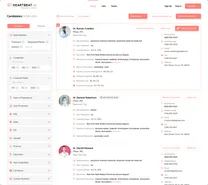Doctors are a part step for any healthcare facility, aiming to ensure the highest level of patient care. With over 1.1 million physicians in the U.S. alone, finding the right one can seem daunting. However, there are strategies to hire the right doctor for your clinic or hospital. So, how to hire a doctor strategically?
To hire a doctor, identify your facility’s needs, create a detailed job description, utilize various recruitment channels, conduct thorough interviews, verify credentials, and make a competitive offer.
This is just the beginning and there is more to it. This guide breaks down and tells you how to hire a private doctor into manageable pieces, offering valuable tips. Apart from that, we’ll also discuss Heartbeat, an efficient platform to access contact information for thousands of qualified doctors.

What’s on this page:
Why Hire a Doctor?
A doctor is a critical decision for any healthcare facility. Here are five reasons why bringing a doctor on board is essential:
- Expert Patient Care: Doctors have the training and knowledge to diagnose and treat illnesses. They can manage complex health issues that other healthcare professionals cannot.
- Enhanced Reputation: Having skilled doctors on staff boosts your facility’s reputation. Patients are more likely to trust and choose your services.
- Comprehensive Services: Doctors allow you to offer a wider range of medical services. They can perform surgeries, prescribe medications, and provide specialized care.
- Patient Satisfaction: Doctors play a key role in patient satisfaction. Their ability to provide effective treatment and compassionate care is vital.
- Collaborative Care: Doctors work alongside nurses, therapists, and other healthcare staff to provide holistic care. Their leadership in healthcare teams ensures coordinated and efficient patient care.
How to Hire a Doctor: Step-by-Step Guide
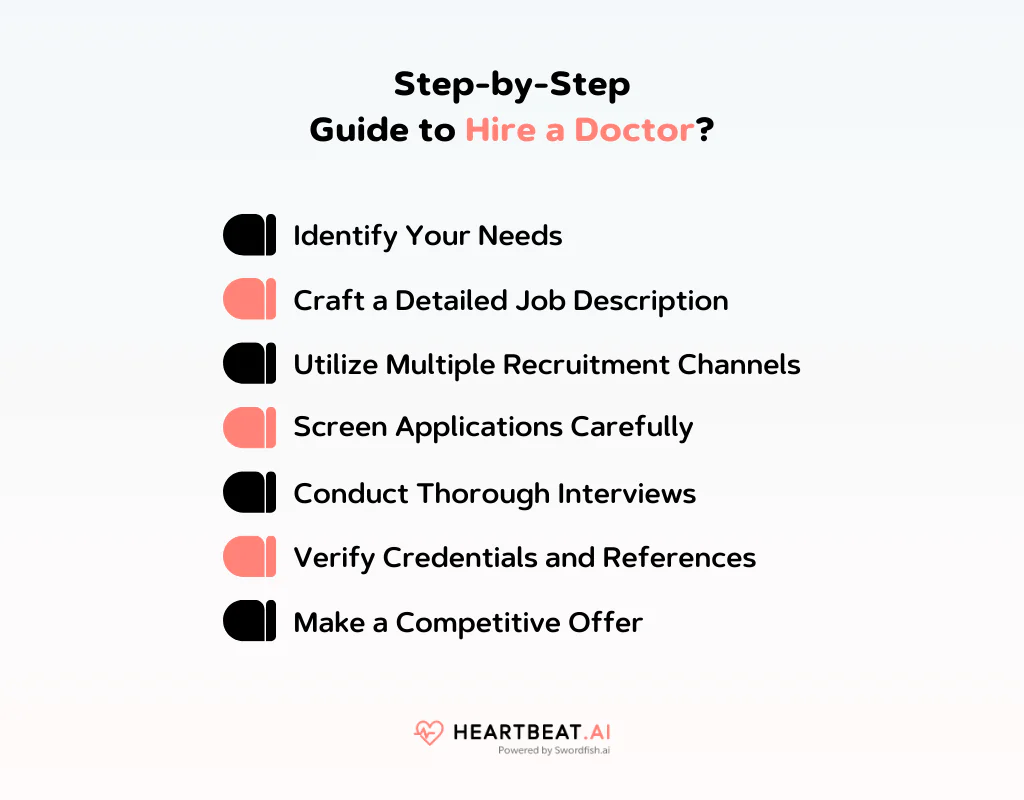
Hiring a doctor is a careful process that demands careful planning and execution. Follow this step-by-step guide to ensure you hire the right doctor for your team.
Step 1: Identify Your Needs
Start by assessing the specific needs of your facility. Determine the type of doctor you need, considering their specialty, experience level, and the patient demographics they will serve.
Consider the gaps in your current team and how a new doctor can fill those. This step sets the foundation for your recruitment process.
Step 2: Craft a Detailed Job Description
Write a clear and comprehensive job description. Include the necessary qualifications, responsibilities, and any special skills you’re looking for.
Highlight the benefits of working at your facility. A well-written job description attracts the right candidates.
Step 3: Utilize Multiple Recruitment Channels
Advertise the position across various platforms. Use online job boards, medical recruitment agencies, and social media to reach a broad audience.
Networking with medical schools and professional associations can also uncover potential candidates. You can use them to hire a doctor online.
Step 4: Screen Applications Carefully
Review applications thoroughly. Look for candidates with the required qualifications and a proven track record.
Consider their experience, education, and any additional skills that could benefit your team. Initial screening might include a review of CVs, cover letters, and any supporting documentation.
Step 5: Conduct Thorough Interviews
Arrange interviews with shortlisted candidates. Use this opportunity to assess their clinical competence, communication skills, and how they fit with your team’s culture.
Consider involving a panel of interviewers, including medical and administrative staff, for a well-rounded evaluation.
Step 6: Verify Credentials and References
Before making an offer, check the candidate’s credentials and references. This includes verifying their medical license, board certifications, and any malpractice history. Contacting previous employers can provide insights into their work ethic and professionalism.
Step 7: Make a Competitive Offer
Once you’ve identified the right candidate, make a competitive offer. This should include a fair salary, benefits, and any incentives that make your facility an attractive place to work. Be prepared to negotiate to secure your top choice.
Where to Find Doctors for Hire?
Finding the right doctor to hire can be a challenge. Here are several effective methods to find doctors for hire:
- Medical Conferences and Seminars: These events are great for meeting doctors actively seeking opportunities. You can learn about their specialties and interests firsthand.
- Healthcare Job Boards: Websites dedicated to medical and healthcare jobs are filled with profiles of doctors looking for new positions. These platforms make it easy to post job listings and reach out to potential candidates.
- Professional Networks: LinkedIn and other professional networking sites offer a way to connect with doctors. You can see their credentials, experiences, and recommendations from colleagues.
- Get a Doctor Email List: An email list of doctors can directly connect you with doctors interested in job opportunities. Heartbeat AI can provide such lists, making it easier to reach out to potential candidates quickly.
- University Medical Programs: Contacting medical schools can help you connect with new graduates or alumni interested in job opportunities. These institutions often have career services that facilitate such connections.
Find the Contact List of the Best Doctor
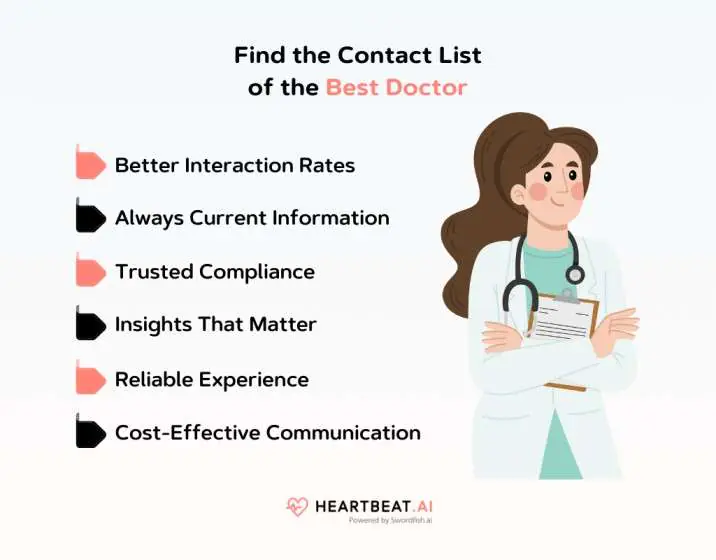
When searching for the best doctors to hire, having the right tools and information is crucial. And here’s how Heartbeat stands out:
Better Interaction Rates
Heartbeat ensures your messages reach the right people. With access to over 11 million healthcare professionals in the USA, you have a vast pool to contact. This includes 8.8 million direct cell phone numbers. Plus, there are 9.3 million personal email addresses.
With these numbers, you’re much more likely to get a response. You can expect an 84% accuracy rate for cell numbers and 92% for personal emails right from the start.
Always Current Information
The data you get from Heartbeat Prospector is fresh and regularly updated. This means you’re always reaching out with the latest contact information, ensuring no time is wasted on outdated details.
Trusted Compliance
Using Heartbeat, you can trust that your outreach complies with industry standards. This peace of mind is invaluable in the healthcare recruitment process.
Insights That Matter
Gain valuable insights into the qualifications and interests of potential candidates. Heartbeat’s platform provides detailed information, helping you make informed decisions about who to contact.
Reliable Experience
With Heartbeat, you’re using a tool backed by years of experience in healthcare professional outreach. This experience translates into more effective and efficient recruitment efforts.
Cost-Effective Communication
Reaching out to potential candidates can be affordable. Heartbeat offers a cost-effective solution. You get access to 6 million direct dials. Plus, with our Chrome extension, you can find contacts across LinkedIn, Facebook, and the web.
Skills to look for in a Qualified Doctor
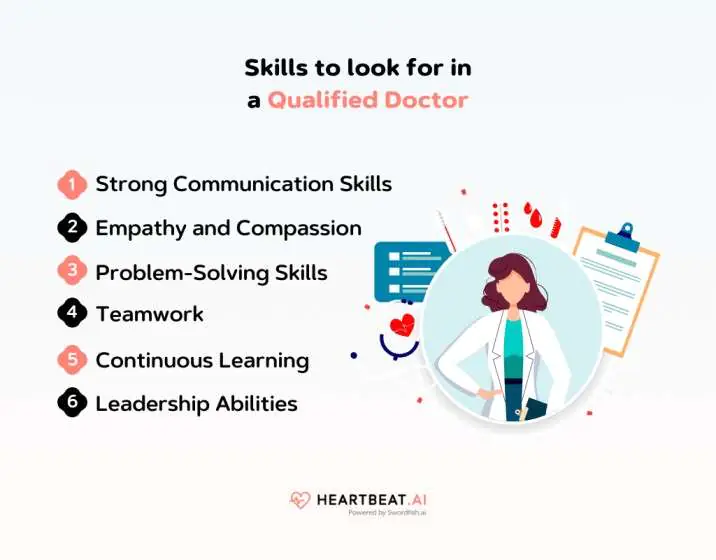
When hiring a doctor, it’s important to look beyond just credentials. Here are some skills and qualities to consider:
1. Strong Communication Skills
Doctors must explain complex medical information in understandable terms. They should listen carefully to patients and their families. Good communication builds trust. It also improves patient satisfaction.
2. Empathy and Compassion
A good doctor shows genuine care and concern for patients. They understand and empathize with their patients’ feelings and situations. This compassion can make a big difference in patient care. It helps in building a strong doctor-patient relationship.
3. Problem-Solving Skills
Doctors face complex cases that require quick and accurate decision-making. They need to analyze information and come up with effective treatment plans. Strong problem-solving skills are crucial. This ability can save lives and improve health outcomes.
4. Teamwork
Doctors rarely work alone. They must collaborate with nurses, specialists, and other healthcare professionals. Being a team player ensures coordinated and comprehensive patient care. Good teamwork skills are essential for a smooth working environment.
5. Continuous Learning
Medicine is always advancing. A qualified doctor stays updated with the latest in medical research and technology. They’re committed to lifelong learning. This dedication ensures they provide the best care possible.
6. Leadership Abilities
In many settings, doctors are seen as leaders of the healthcare team. They should guide and inspire their colleagues. Strong leadership ensures high standards of care. It also fosters a positive and productive work environment.
How Much Does it Cost to Hire a Doctor?
Hiring a doctor typically costs between $150,000 to over $500,000 annually. This range depends on their specialty, experience, and the practice’s location.
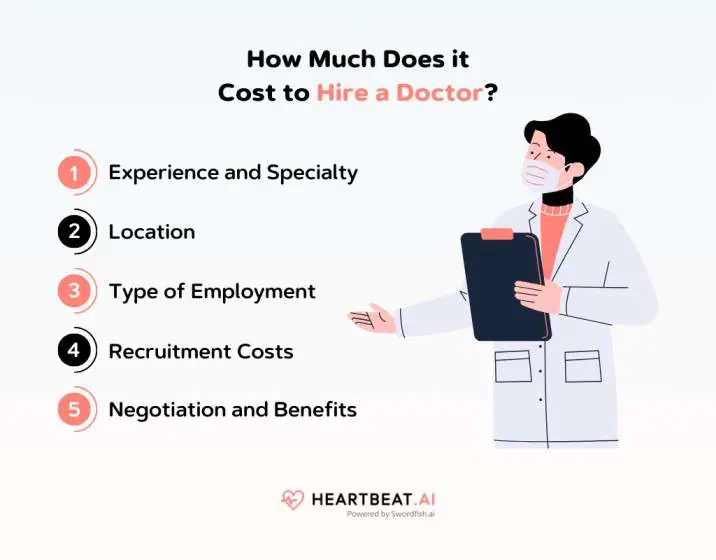
Let’s discuss them in more details:
1. Experience and Specialty
Doctors with lots of experience or who specialize in certain areas usually cost more. They have spent many years learning and working. Their skills are in high demand.
This means they can ask for higher pay. Specialties like surgery or cardiology often have higher salaries than general practice.
2. Location
Where your healthcare facility is located also affects the cost. Big cities usually mean higher salaries for doctors. This is because living there costs more. But, in rural areas, you might need to pay more to attract doctors.
3. Type of Employment
Are you hiring a doctor full-time, part-time, or temporarily? Full-time doctors get a salary and often benefits like health insurance.
Part-time or temporary doctors might get paid by the hour or day. Their rates can be higher because they don’t get benefits.
4. Recruitment Costs
Finding the right doctor can cost money too. You might need to advertise the job or use a recruitment agency. These services are not free. But they can help you find a good match faster.
5. Negotiation and Benefits
Doctors’ salaries are often open to negotiation. They might ask for more money or benefits like extra vacation time. Offering a good package can attract better candidates. But it will also increase the cost.
Doctor Interview Tips
Interviewing a doctor is a key step in ensuring your healthcare team is strong and skilled. Here are some simple tips to help you during the interview:
- Know their background: Look at their resume before the interview. This helps you ask better questions.
- Ask open questions: Use questions that make them talk more about their experience and ideas. This shows how they think.
- Talk about real situations: Give them examples of challenges they might face. See how they would solve these problems.
- Goals matter: Ask where they see themselves in the future. It helps you know if they fit your team for the long term.
- Teamwork is key: Find out how they work with others. Good teamwork is important in healthcare.
- Balance life: Ask how they handle stress. Doctors need to take care of themselves to take care of others well.
Conclusion
That’s all we’ve got on how to hire a doctor. To sum it up, hiring a doctor is a careful process that needs thought and attention. It’s about finding someone with the right skills, who also fits well with your team. You want to hire a doctor who can handle the job’s demands and work well with others.
The interview is your chance to see if they match what you need. Remember to ask about their experience, how they deal with tough situations, and their goals.
It’s also important to see if they’re good at teamwork and managing stress. Choosing the right doctor helps ensure your patients get the best care.
FAQs
What qualifications should I look for in a doctor?
Look for a medical degree and a license to practice. Also, check for any special training or certifications they have in their field.
How can I verify a doctor’s credentials?
You can check their credentials by contacting the medical board in your state. Some information might also be available online through professional medical associations.
What’s the best way to find doctors available for hire?
Post your job on medical job boards and use professional networks. Don’t forget to ask for recommendations from colleagues in the healthcare industry.
How long does it usually take to hire a doctor?
The time can vary but expect it to take several weeks to a few months. This accounts for reviewing applications, interviewing, and credential verification.
Who hires doctors at a hospital?
At a hospital, the human resources department or a specific medical department head usually hires doctors. They work together to find the best candidates for the hospital’s needs.

